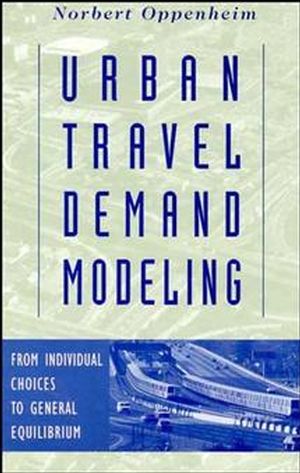Urban Travel Demand Modeling: From Individual Choices to General EquilibriumISBN: 978-0-471-55723-4
Paperback
504 pages
February 1995
 This is a Print-on-Demand title. It will be printed specifically to fill your order. Please allow an additional 10-15 days delivery time. The book is not returnable.
|
||||||
A state-of-the-art approach to urban travel demand modeling
Currently used travel forecasting methodology was developed almostthree decades ago, primarily to assess the impacts of large-scalecapital improvement projects, and was not designed to deal withcontemporary urban transportation problems. To be effective today,travel demand models must explicitly represent traveler behavior,must be policy-sensitive, and must be operationally reliable.
Urban Travel Demand Modeling: From Individual Choices to GeneralEquilibrium presents an integrated system of models which overhaulthe four traditional phases of travel generation, modal split, tripdistribution, and network assignment. This book shows, for thefirst time, how generalized network equilibrium may be rigorouslyforecast from the optimal travel choices of "trip consumers"without the need to resort to heuristic procedures such asfeedbacks. In addition, models for optimal transportation supplydecisions are integrated with the demand models. Transit travel andgoods movements are specifically addressed.
To make this book as self-contained as possible, the authorprovides review material on the mathematics required and the basicconcepts of discrete choice modeling. Numerical examples throughoutthe book demonstrate the calibration and use of the models in avariety of situations, including uncongested and congestednetworks. Review problems are systematically provided, many withsolutions. Illustrative add-on software for model implementation onseveral popular platforms is also available separately.
Urban Travel Demand Modeling may be used at the senior and graduatelevels in civil engineering, economics, operations research, urbanand regional planning, and geography courses. Transportationprofessionals in the private and public sectors, academics andresearchers, will also find this methodology a rich, versatile, andefficient tool with which to address major urban transportationissues, including demand management, road and parking pricing,environmental impacts, changing socioeconomic and activitypatterns, and urban development.
Currently used travel forecasting methodology was developed almostthree decades ago, primarily to assess the impacts of large-scalecapital improvement projects, and was not designed to deal withcontemporary urban transportation problems. To be effective today,travel demand models must explicitly represent traveler behavior,must be policy-sensitive, and must be operationally reliable.
Urban Travel Demand Modeling: From Individual Choices to GeneralEquilibrium presents an integrated system of models which overhaulthe four traditional phases of travel generation, modal split, tripdistribution, and network assignment. This book shows, for thefirst time, how generalized network equilibrium may be rigorouslyforecast from the optimal travel choices of "trip consumers"without the need to resort to heuristic procedures such asfeedbacks. In addition, models for optimal transportation supplydecisions are integrated with the demand models. Transit travel andgoods movements are specifically addressed.
To make this book as self-contained as possible, the authorprovides review material on the mathematics required and the basicconcepts of discrete choice modeling. Numerical examples throughoutthe book demonstrate the calibration and use of the models in avariety of situations, including uncongested and congestednetworks. Review problems are systematically provided, many withsolutions. Illustrative add-on software for model implementation onseveral popular platforms is also available separately.
Urban Travel Demand Modeling may be used at the senior and graduatelevels in civil engineering, economics, operations research, urbanand regional planning, and geography courses. Transportationprofessionals in the private and public sectors, academics andresearchers, will also find this methodology a rich, versatile, andefficient tool with which to address major urban transportationissues, including demand management, road and parking pricing,environmental impacts, changing socioeconomic and activitypatterns, and urban development.



